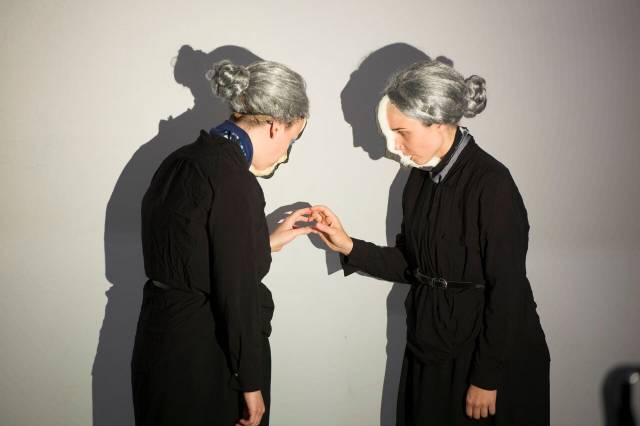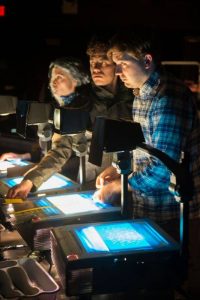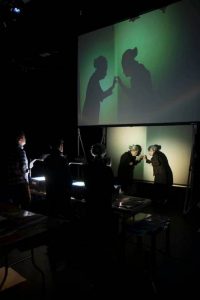

An elderly woman, Ada, grieves for her twin sister Ava in the remote New England lighthouse they once shared, but then a visit to the carnival creates a ghostly opportunity for a reunion as well as a journey through memory and mourning. ADA/AVA plays at the 3LD Art & Technology Center until July 26th. The spectacle is distinctive and memorable but it is much more than that. Chicago's Manual Cinema uses shadow puppetry, projected imagery, multiple screens and an original live score to convey a story that is stunningly cinematic and emotive. Among its five artistic directors are Drew Dir (ADA/AVA's director and designer), Julia Miller (one of the puppeteers who plays Ada), and Kyle Vegter (co-composer/co-sound designer).
The secrets to ADA/AVA's staging are visible and provide ready-made jigsaw pieces for anyone interested in solving the puzzles of its production. The 'behind the scenes' action occurs in the foreground; it has its own fluidity. Does Manual Cinema present all of its shows this way?
Drew Dir: We have a studio in Chicago. We're based there so we don't necessarily have a theater where we perform in all the time. We tour a lot and when we first started making this work, we were all hidden from the audience. Then at the end we would invite people behind the screen to show them everything and explain how we did it. When we were given opportunities to perform in bigger venues, we came up with this set-up. We realized that it was a lot of fun to be able to watch the work at the same time as you were able to watch how it was made because it gave you a lot of points of interest to look at. Now, basically whenever it's possible, we perform it in this way.
ADA/AVA draws on many cinematic traditions in a very beautiful way. Are there any particular films or stories that influenced this show especially? Hitchcock, David Lynch and German Expressionism come to mind.
Drew: Definitely Hitchcock, in particular Hitchcock's Vertigo.
Kyle Vegter: I think for the music especially, David Lynch in the sound design, like a hyper-real sound design. Things are louder than they are in real life and they move around the room in a way that they don't in real life, that's all pretty much Lynchian. And the music in general I think is influenced by his work.
Drew: We have spoken about Expressionist films, especially in some of the performance that we do.
Julia Miller: We changed some of the story from the last time we performed it. A little more horror was dropped in and I was really excited to play with some of the German Expressionistic silent film acting, just a little bit though. You're working non-verbally and it's physical and it's terror but it's really contained, so I kept thinking of Metropolis and The Cabinet of Dr. Caligari.
While there are elements of terror and suspense, ultimately this feels like a meditation on loss and memory. To your minds, is ADA/AVA a horror story?
Drew: I think it's much more about grief and dealing with the death of someone that is almost your reflection. I think there is certainly aspects of horror, more in the design and the style that we're telling the story through, but yes I agree, the story is about loss and grief.
There are no writing credits with this show. Where did the initial idea come from or is it collaborative?
Drew: I brought the idea into the company and then through developing it over the years, everyone has their print on it. But it was part inspired by watching my grandfather grieve for my grandmother when she died. That matched up with my interest in Hitchcock. I'd been working on a production of Shakespeare's The Comedy of Errors at the time which is about twins, and if you play it differently, it can be like a horror story. It can be incredibly frightening because there's something uncanny about twins. Actually Julia is a twin.
Julia: We're not identical and I had to be really clear with my sister, this is not about us. (Laughs) The show is not inspired by true events.
Drew: Also her sister is the lighting designer.
Julia: That's why I think also the ADA/AVA flashback [to when they were children] was really resonant with me because they're literally playing tug-of-war over things and we still do that but more verbally.
Kyle: They did it over the lighting.
Do you perceive ADA/AVA as two sides of one person, or are their personalities distinct in your minds?
Julia: It's interesting, there are a couple of different iterations of Ava, like in the real world we have more separate personalities but in the real world she's a shell of herself, a not totally fleshed-out person yet. She's more of a reflection and fulfilling what I want her to, except when it starts to not go very well. And this iteration has a couple of new scenes where we see the flashback of them as children. It unearthed a lot of more of their relationship and shows their dichotomy as children, which then also reflected how I saw their characters when they're older. It showed more of the back and forth of being a twin and also having a sibling. You fight but you also love each other. It added a little more complexity to their characters. You view them more as two separate people.

The use of shadow puppetry in ADA/AVA aids a wonderfully dreamy atmosphere. What was it that got you into puppetry in the first place?
Drew: I never studied exclusively puppetry and none of us, most of all Kyle, thought we were going to end up doing puppets as a form of artistic expression. And we don't always think of what we do as puppetry, but a lot of us have had experience with physical theater and spectacle theater which included puppets. We're all from Chicago, which has the Redmoon Theater. That does a ton of visual theater and a lot of us have been introduces to puppetry through Redmoon before.
Julia: Sarah, one of the other artistic directors, and I had worked on a shadow puppet show, a version of Swan Lake that used overhead projectors. We wanted to create something ourselves so then we got together to make a show and then that was when the company started I guess. So we just made this one project together with some overhead projectors and some shadow puppets and expanded on it. We fell into it.
How comfortable or uncomfortable are your puppet masks, held onto your face by the mouthpiece? They're reminiscent of a horse bit.
Julia: In order to make our profiles match the puppets we came up with this idea of the mask, so that I can still have full vision on either side of my face. A full-headed mask really inhibits what you're able to see. We're doing so much interacting with the silhouettes on the screen that I wanted to come up with a way of transforming our silhouettes as actors. Hence the mask goes right against your profile but then in order for it to stay on, the mouthpiece was a solution that helped base it somewhere, but they are molded to our mouths. It is hard but you have to learn to work with it. I mean it's pretty specific because it changes the way you swallow. Now, with all the action that happens, I get really sweaty so there's a lot of stuff that I'm dealing with. The other day my mouth was actually sore for the first time but today I feel fine.
The carnival is such an important aspect of ADA/AVA. There is something about carnivals that lend themselves to the inspection of memory and dreams with their ghostly music and age-old mystery. Does the carnival in general have any significance or special meaning to you in your lives?
Drew: Ada lives in a lighthouse which is a fixed location. She lives there her whole life and the carnival is something that travels and lives not only outside her world but outside of society. But also I think it came from Ray Bradbury's Something Wicked This Way Comes, which is a carnival that comes to town to show you your deepest desires and also horrors.
Kyle: For me it also puts the show in Autumn, which does a lot of setting work for us. Carnivals are kind of an autumn festival kind of thing, that's my association.
Julia: I feel like what's so great about that sequence with her wandering through the carnival, is that you get to be a kind of meditative version of her, where you see all the things she's seen and the cello gives you an emotional access to what's happening to her there. Kind of like the world expands and things move really slowly and fluidly and it's a nice tonal shift to what's happening before and what's about to happen. The music there does a really great job of relating what her emotional state is. In general, the music is really important because it's non-verbal. It helps us transition and tells us what is happening with the character.
In what way did you think about the construct of time or the time period while putting this production together?
Julia: Two of our shows take place in the present, distant past and future. The setting is really specific but the time period is a little amorphous.
Drew: The people who are watching the show have a natural nostalgia associated with overhead projectors because most people experience that at school. Sometimes we play into that. In this show, it's a timeless story but it does reference the past a little bit. But sometimes we work against that. Our most recent show Mementos Mori is set in the present. It's about death but it's also about the way we experience death with smartphones, the internet and Facebook, so we actually made shadow puppet versions of iPhones and iPads that the characters use. It plays against the analogue instruments in a really interesting way. But I think the point is that we're always conscious of the fact that we're referencing a different time when we're using these instruments.
Kyle: I think the music for this show and the music for most of our shows is based on what's happening right now and maybe in the eighties/nineties. We don't do a lot of period stuff. In this show, the music does the same thing, morphing between past and present. We do some Billie Holiday covers so we're transported back to that time period, but then most of the score is very ambient and Lynchian. We're reflecting what the puppetry does in the music.

While the multimedia aspect of Manual Cinema is very complex, there is a clever and appealing minimalism in the execution of it. Is that something you wish to maintain? If you had a dream budget beyond your wildest dreams, are there any changes you'd make?
Drew: We kind of just did that with Mementos Mori. I feel like since the beginning of our company we have been pushing the medium and expanding and seeing how complex the imagery can be or how many projectors we can use at the same time and how many puppeteers. With Mementos Mori we actually have two screens, and above about seven projectors. Its an eleven person cast so six puppeteers...
Julia: ...live video editor, live sound and three musicians. And then we're live editing between the small screens on the big screen, so that was the big issue.
Drew: That felt like us maxing and trying to do all the things that you can do with the medium in one show.
Kyle: I don't think we'd necessarily throw more money at it to fulfill our wildest artistic dreams.
Drew: The overhead projectors, they're pretty cheap.
Kyle: We'd probably pay people more and hire a stage manager.
Through July 26 at 3LD.